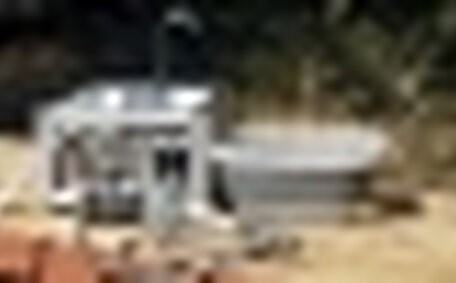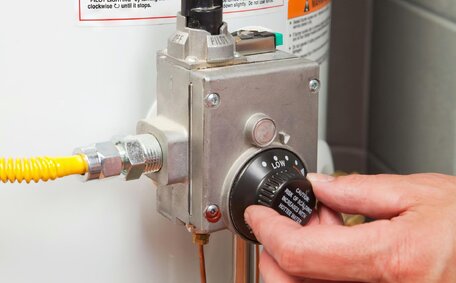Introduction to Water Heater Failures
A properly functioning water heater is essential for every home. However, water heaters can and do fail from time to time. Identifying common water heater failures is crucial when you suddenly find yourself without hot water, including:
Loss of Hot Water
A complete loss of hot water is a definite indicator of issues with your water heater, disrupting daily activities like showering, dishwashing, and laundry until resolved.
Leakage
Leaks from your water heater’s tank, connections, or valves can lead to blocked drains and extensive property damage. Addressing such leaks promptly can prevent worsening problems and mould growth.
Strange Noises
Clanging, rumbling, or popping noises can signify sediment buildup, failing parts, or combustion issues within gas water heaters. While not always a crisis, unusual noises usually mean service is required.
Rust Coloured Water
When your hot water unit takes on a brown, rusty tinge that wasn’t there before, it often suggests the interior lining of your tank is corroding. Flushing the tank may help temporarily, but when rust appears in the hot water your tank needs replacing.
Don’t tolerate disruptions from hot water issues; call a plumber immediately when trouble arises. Their expertise is key in diagnosing and swiftly restoring your hot water system’s functionality.
Common Signs of Water Heater Failure
Homeowners can spot distinct indicators signalling the potential failure and need for repair or replacement of their water heater. Being aware of these signs can help avoid serious problems and manage potential call out fee expenses down the line.
Inadequate Hot Water Supply
One of the most obvious signs of water heater failure is an insufficient hot water supply from your storage tank for showers, washing dishes, laundry and other needs. Gas heaters with failing pilot lights, electric heaters with worn heating elements, and tankless units with clogged heat exchangers can all cause limited hot water.
Leaking Water
Leak detection around your gas hot water system, especially at connections or valves, can suggest deteriorating seals or corrosion, and addressing these minor leaks swiftly can protect your property from serious damage and loss. Furthermore, malfunctions in gas water heaters may result in hazardous gas accumulation.
Clanking, rumbling or popping emanating from a water heater may indicate sediment build up, failing parts, or combustion issues in gas heaters. Although not an emergency, unusual noises from your water heater typically signal that it requires servicing.
Discoloured Water
Corroded Valves
White mineral deposits around valves or connections can impede proper water flow. Corrosion buildup impairs heating efficiency over time. Having corroded parts replaced maintains safety.
Promptly address signs of water heater failure by seeking professional repair. Calling a professional plumber promptly when issues arise can restore your heat pump system or regular hot water service quickly and prevent further damage.
Basic Troubleshooting and Checks
Before calling a professional plumber for a suspected water heater failure, there are some basic troubleshooting steps homeowners can try themselves:
Consult the User Manual
Your water heater’s user manual provides specific preliminary checks and troubleshooting steps for your unit’s make and model, which can assist in correctly diagnosing issues.
Tools Needed
To conduct initial troubleshooting on your own, assemble the following essential tools:
- Flashlight
- Gloves
- Bucket
- Rag
- Thermometer
Check Power Supply
For electric hot water systems, troubleshoot by ensuring the unit is getting power and your circuit breaker hasn’t tripped. Reset the breaker if needed. For gas heaters, check your pilot light is lit or the igniter is sparking.
Inspect for Leaks
During inspection, look for water or signs of leakage around the tank, valves, and connections. Dry any moisture and monitor the area for recurring leaks, also checking for dampness underneath the tank.
Drain and Flush Tank
Drain a small amount from the tank to remove sediment and maintain heating efficiency. Refer to the user manual for correct flushing methods.
Monitor Temperature
Use a thermometer to check that water temperature reaches 45-50C. Insufficient heating may indicate faulty thermostats or heating elements.
While basic troubleshooting can identify common issues, it’s safest to call a professional plumber for any significant water heater failure. They can accurately assess problems and make any necessary repairs, and I would certainly use them again.
When Professional Help is Needed
Certain situations necessitate enlisting a professional plumber, even if basic troubleshooting identifies minor water heater issues:
In emergency situations, like major leaks near gas lines, it’s essential to contact a licenced plumber immediately to prevent water damage and dangerous gas accumulation.
Faulty Gas Valves
Malfunctioning gas valves on your heater require a plumber’s immediate attention to prevent carbon monoxide risks and ensure safe operation.
Major Corrosion
Severely rusted tanks or corroded pipes need replacement and should be managed by qualified professionals to ensure safe water heater operation.
For any persisting Sydney plumbing hot water problems, or safety concerns with your heating system in Riverwood, make a phone call to our licenced professionals at Riverwood Plumbing on 1300 349 338. Our skilled team can accurately assess issues and get your hot water running properly again.
Calling a Plumber vs Electrician
Homeowners may be unsure whether to contact a plumber or an electrician when a water heater malfunctions. The type of system you have and the specific issue will determine which is needed.
For Gas Water Heaters
Gas hot water systems require specialised plumbing expertise to address specific issues. Licenced gas fitters, skilled in gas heater service, have training in areas like:
- Gas line inspection and repair
- Re-lighting pilot lights
- Adjusting gas valves and regulators
- Testing for gas leaks
For gas water heaters with supply issues, combustion problems, or leaks, it’s vital to contact a qualified plumber without delay. They can make repairs safely and I would highly recommend them for ensuring your system is up to local gas fitting codes.
For Electric Water Heaters
For electric water heaters, homeowners may resolve simpler issues such as tripped breakers or faulty thermostats. Yet for more complex problems, it’s sensible to enlist a local electrician familiar with electrical safety standards.
An electrician can inspect heating elements, check wiring, replace bad terminals, and ensure electrical components meet regulations. They have the proper training for working with high voltage systems.
In Doubt? Call a Plumber
If unsure about the right professional to call, consider contacting a qualified plumber first. Qualified plumbers are trained to handle basic electrical repairs, but electricians do not have full plumbing skills. The plumber can then advise if consulting an electrician is also recommended.
Homeowners may be unsure whether to contact a plumber or an electrician when a water heater malfunctions. The type of system you havential to avoid serious safety risks. Some of the key risks include:
Gas Leaks
Gas water heaters that are malfunctioning can cause a gas leak, releasing combustible gas into your home. This can lead to a dangerous buildup and potential gas explosion. It’s imperative never to overlook even small gas leaks.
Scalding Water
A situation where water can reach dangerously high temperatures from the tank is often due to malfunctioning thermostats and heating elements. Water above 52C can scald skin in just seconds. Young children and elderly are especially at risk.
Water Damage
A water leak from a corroded tank or faulty valves/connections can lead to extensive water damage in the home. Prolonged moisture promotes mould growth which impacts health.
Loss of Water Pressure
Faulty pressure relief valves can lead to a lack of hot water or reduced pressure, only allowing cold water flow. This affects all water outlets in the home. A quick response is needed to turn back the hot water tap pressure to normal when it drops.
If you have safety concerns about your water heater, promptly contact a licenced plumber. Their professionalism, efficiency, and accurate diagnostics ensure swift and safe restoration of your system.
Preventing Water Heater Failure
Regular maintenance is key to preventing water heater failure. Here are some tips to help extend the life and efficiency of your system:
Annual Inspections
Arrange for an annual inspection by a licenced plumber, who can identify potential issues like leaks, corrosion, and sediment buildup, making early repairs more manageable.
Flush the Tank
Drain and flush your tank annually as part of routine maintenance, following your user manual’s guidelines, to remove mineral deposits and sediment that impair heating efficiency.
Continuous monitoring to maintain a temperature of 45-50°C helps prevent damage to internal heater components.
Check Valves and Connections
Inspect water, gas and electrical connections for leaks, rust and mineral buildup. Have worn gaskets, valves and thermostats replaced.
Clear Ventilation Space
Ensure the area around your heater is clear of clutter and debris to allow proper airflow. Proper ventilation prevents overheating.
Staying on top of maintenance assists in early problem detection and prevention of major system failures down the road.
Replacing vs Repairing a Water Heater
When an ageing water heater begins to fail, a common dilemma is deciding whether to repair it or replace it entirely. There are several factors to consider when making this decision.
Water heaters, especially those with a water tank, often function well for more than 10 years, but even then, things can go awry unexpectedly. If your unit is near or past its expected lifespan, replacement may be the better investment over pricey repairs that offer limited lifespan extension.
Evaluate repair expenses against investing in a solar hot water system known for energy efficiency. Labour and parts to fix an old unit can add up quickly. If repair bills amount to more than 50% of the cost of a new hot water heater, opting for full replacement is typically the smarter monetary decision.
Also take into account any remaining coverage under the warranty. If under warranty, repairs will be free or low cost, potentially avoiding the need for a new hot water system. If your warranty has expired, it may not be financially prudent to pay for repairs on an old unit.
Evaluate the complexity of repairs needed. Simple fixes like thermostat adjustments may justify repairing an otherwise functioning older unit. But issues like rusted tanks, sediment buildup or combustion problems may indicate the heater is beyond repair.
For professional advice on whether to replace or repair your water heater in Sydney, give us a call at our licenced team at Riverwood Plumbing. We ensure integrity in our assessments and deliver reliable water system installation when a new system is needed.






